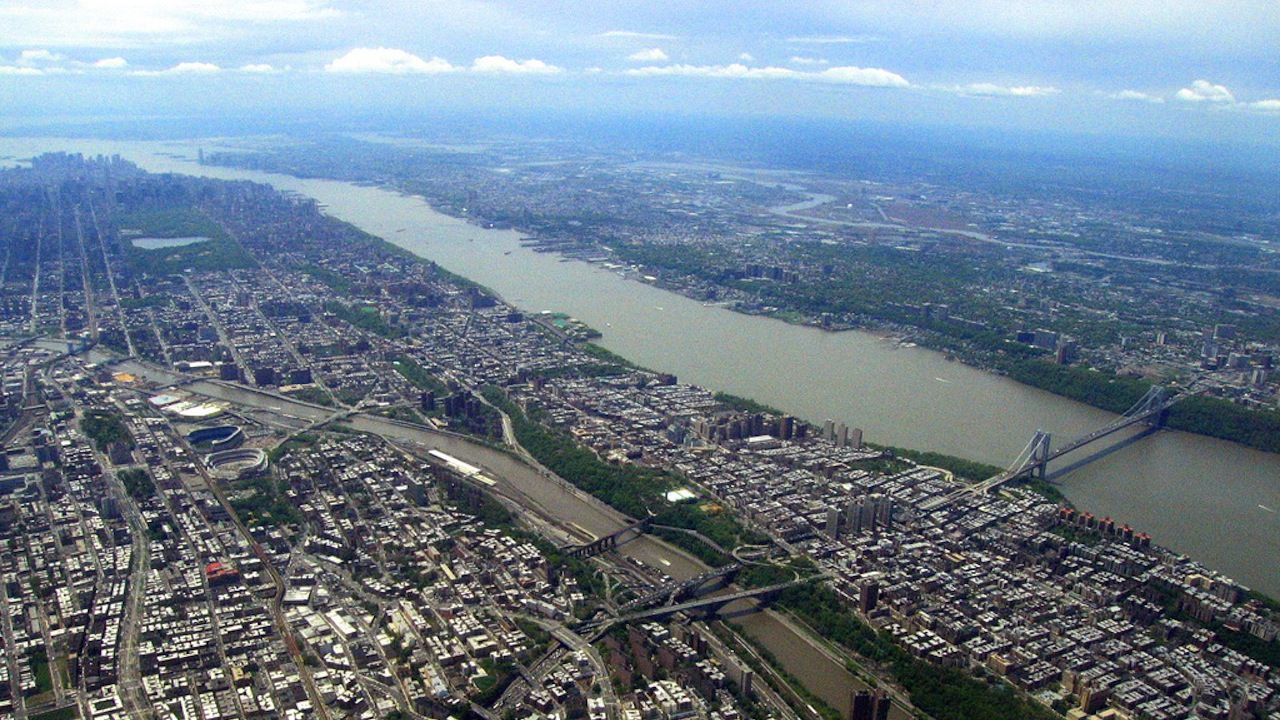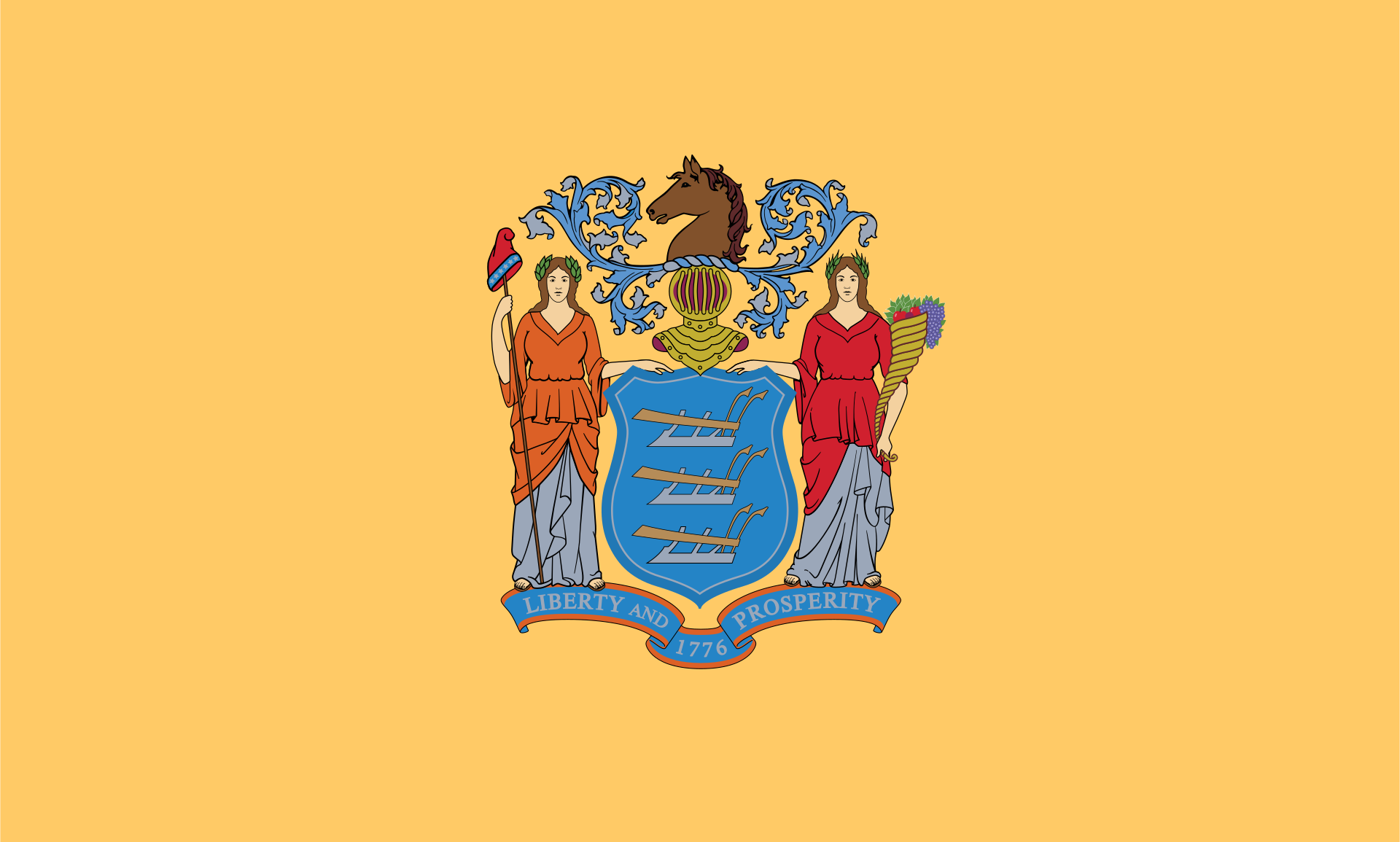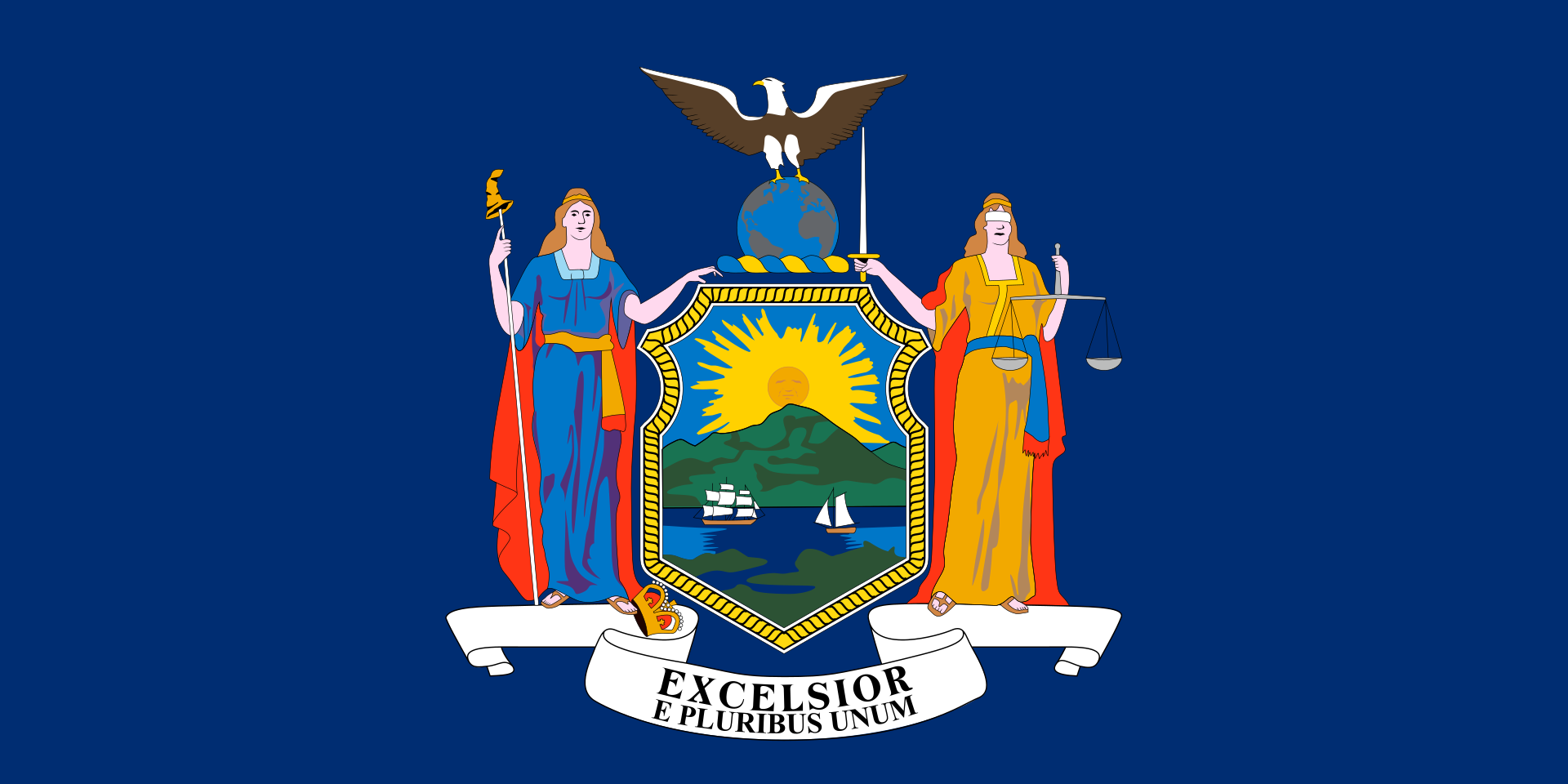
Der Hudson entspringt im US-Bundesstaat New York in den Adirondack Mountains am Henderson Lake. Von dort fließt er überwiegend in südlicher Richtung durch diesen Staat und nimmt bei Albany das Wasser des Mohawk River auf. Nur im Unterlauf bildet er teilweise die Grenze zum Nachbarstaat New Jersey und erreicht vor seiner Mündung den New Yorker Hafen. In den Atlantik mündet er zwischen den Inseln Manhattan und Staten Island in die Upper New York Bay.
Der Unterlauf des Hudson ist dem Einfluss der Gezeiten unterworfen. Der Tidenhub macht sich noch über 225 Kilometer flussaufwärts, bis zum Wehr in Troy, nördlich von Albany, bemerkbar. Daher kann der Hudson nicht auf ganzer Länge als Fluss bezeichnet werden. Dieser Abschnitt wird als Estuary (dt.: Ästuar) bezeichnet.
Der Hudson entwässert zusammen mit seinen Nebenflüssen, insbesondere mit dem Mohawk River, ein großes Gebiet im Osten der USA.
Wegen der Schönheit des Hudsontals wurde dem Hudson River die Bezeichnung Der Rhein Amerikas verliehen.
哈德逊河(英语:Hudson River,又译赫逊河)是美国纽约州的大河,长507公里,发源于纽约上州阿第伦达克山脉,上游分出莫华克河,西接伊利运河(可达五大湖),流经哈德逊河谷后汇入纽约港,是纽约州的经济命脉。自北向南,流经纽约州东部、纽约市、奥尔巴尼市。下游为纽约州和纽泽西州的边界。
1524年,意大利探险家乔瓦尼·达韦拉扎诺穿过上纽约湾,到达今天纽约市,他提出这里是一条大河入海口。达韦拉扎诺因此而闻名于世。河流名称则来源于英国探险家亨利·哈德逊,他溯河而上到达今天特洛伊一带。
哈德逊河下游实际上是潮汐型河口,潮汐甚至能够影响到特洛伊的“联邦水坝”处,大潮甚至可令纽约港部分地区难以航行。冬季,哈德逊河的浮冰因为潮汐的缘故或南或北地流动。哈德逊河在美洲印第安语中名为“Muhheakantuck”,意思是“两向流动的河”,这体现了哈德逊河的河口特性。哈德逊河的正式源头是云之泪湖。
ハドソン川(ハドソンがわ、英: Hudson River)は、アメリカ合衆国の主にニューヨーク州を流れ、大西洋に注ぐ川である。河口付近ではニューヨーク州とニュージャージー州との境界になっている。ヨーロッパ人で最初にこの川を発見したのはイタリア人のジョバンニ・ダ・ヴェラッツァーノで、1524年のことである。名前は1609年にこの川の探検を行ったヘンリー・ハドソンに由来する。
The Hudson River is a 315-mile (507 km) river that flows from north to south primarily through eastern New York in the United States. The river originates in the Adirondack Mountains of Upstate New York, flows southward through the Hudson Valley to the Upper New York Bay between New York City and Jersey City. It eventually drains into the Atlantic Ocean at New York Harbor. The river serves as a political boundary between the states of New Jersey and New York at its southern end. Further north, it marks local boundaries between several New York counties. The lower half of the river is a tidal estuary, deeper than the body of water into which it flows, occupying the Hudson Fjord, an inlet which formed during the most recent period of North American glaciation, estimated at 26,000 to 13,300 years ago. Tidal waters influence the Hudson's flow from as far north as the city of Troy.
The river is named after Henry Hudson, an Englishman sailing for the Dutch East India Company, who explored it in 1609, and after whom Hudson Bay in Canada is also named. It had previously been observed by Italian explorer Giovanni da Verrazzano sailing for King Francis I of France in 1524, as he became the first European known to have entered the Upper New York Bay, but he considered the river to be an estuary. The Dutch called the river the North River – with the Delaware River called the South River – and it formed the spine of the Dutch colony of New Netherland. Settlements of the colony clustered around the Hudson, and its strategic importance as the gateway to the American interior led to years of competition between the English and the Dutch over control of the river and colony.
During the eighteenth century, the river valley and its inhabitants were the subject and inspiration of Washington Irving, the first internationally acclaimed American author. In the nineteenth century, the area inspired the Hudson River School of landscape painting, an American pastoral style, as well as the concepts of environmentalism and wilderness. The Hudson was also the eastern outlet for the Erie Canal, which, when completed in 1825, became an important transportation artery for the early-19th-century United States.
L'Hudson (en anglais : Hudson River1) est un fleuve de 507 km de long, coulant principalement dans l'État de New York et formant en partie la frontière entre les États de New York et du New Jersey. Le nom du fleuve provient de Henry Hudson, un Anglais naviguant pour le compte des Provinces-Unies et notamment de la Compagnie néerlandaise des Indes orientales (Vereenigde Oost-Indische Compagnie, VOC), qui explora le fleuve en 1609. Cependant, le premier Européen en mesure de l'observer fut l'Italien Giovanni da Verrazano en 1524, dont l'expédition fut financée par les marchands florentins de Lyon et par François Ier.
L'Hudson (507 km) è un fiume degli Stati Uniti d'America, che scorre quasi interamente nello stato di New York e, per un brevissimo tratto del suo estuario atlantico, nel New Jersey, sul cui lato occidentale si affaccia: mentre bagna la città di New York, infatti, separa due suoi borough, il Bronx e Manhattan, dalle contee del New Jersey di Bergen, Hudson, Union e Middlesex.
Grazie a un sistema di canalizzazioni, può mettere in comunicazione il lago Ontario, che bagna il nord dello stato di New York, con l'oceano Atlantico ed è quindi una via strategica di trasporto per imbarcazioni cargo di medio tonnellaggio; è inoltre sottopassato da due gallerie che mettono in comunicazione la città di New York con il New Jersey
El río Hudson es un río de 506 km de longitud, que fluye en dirección sur principalmente por el estado de Nueva York, en los Estados Unidos de América, formando, en su último tramo, la frontera entre los estados de Nueva York y de Nueva Jersey. El nombre del río proviene de Henry Hudson, un inglés que navegaba por cuenta de Francia y Holanda, que exploró el río en 1609. Sin embargo, el primer europeo en explorarlo fue el italiano Giovanni da Verrazano, en 1524, cuya expedición fue financiada por los comerciantes florentinos de Lyon y por Francisco I de Francia. El primer mapa oficializado del mismo fue dibujado poco después, por el explorador portugués Esteban Gómez que lo navegó al servicio de España, dándole el nombre de río San Antonio.
El 11 de septiembre de 1997 el presidente Bill Clinton designó este río como uno de los catorce que integran el sistema de ríos del patrimonio estadounidense.
Гудзо́н (Ха́дсон; англ. Hudson River, могиканск. Muh-he-kun-ne-tuk) — река на востоке США, относящаяся к бассейну Атлантического океана. Длина — 492 км (по другой оценке 520 км), площадь бассейна — около 34,6 тыс. км².




 New jersey-NJ
New jersey-NJ
 New York-NY
New York-NY




